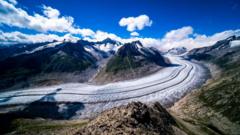The planet's glaciers are experiencing record-breaking melting rates as a consequence of climate change, indicating severe implications for freshwater resources and rising sea levels. A fresh scientific analysis reveals that glaciers have lost more than 6,500 billion tonnes of ice since the beginning of the century, amounting to a startling 5% decrease. Alarmingly, the rate of ice loss has accelerated significantly; over the last decade, glacier shrinkage has exceeded losses recorded from 2000 to 2011 by over a third.
The study, which synthesizes over 230 regional assessments from 35 global research teams, emphasizes an urgent need to understand glacier dynamics in this era of climate change. Mountain glaciers, essential freshwater reserves for millions, could raise sea levels by 32 cm (13 in) if completely melted. Central Europe has experienced extreme changes, losing an alarming 39% of its glacier ice in just over 20 years.
Dr. Michael Zemp, director of the World Glacier Monitoring Service and lead author of the study, articulates the magnitude of loss by comparing it to the total water consumption of the global population over three decades, underscoring the significance of glacier melt. Measurements indicate that between 2000 and 2023, glaciers outside the major ice sheets of Greenland and Antarctica lost approximately 270 billion tonnes of ice annually.
The scientific community has utilized an integrative approach to attain a clearer picture of glacier alterations, employing various data sources from field observations to satellite imagery. This collaborative effort is crucial for informing diverse stakeholders, including other scientists, policymakers, and industries, about the ramifications of global warming.
As glaciers respond gradually to climate changes, they are anticipated to continue retreating for years or even decades. However, the extent of ice loss by the century's end is contingent on humanity's actions concerning greenhouse gas emissions. Potential outcomes range from losing a quarter of the world's glaciers if climate targets are achieved, to nearly half if current trends persist.
The consequences are far-reaching, impacting populations reliant on seasonal meltwater for agriculture and daily usage. As Prof. Zemp points out, the decline of glaciers does not remain localized; it significantly affects ecosystems and communities dependent on this critical water resource.
Sea-level rise is already a pressing issue, with the global average having increased over 20 cm (8 in) since 1900, half of which has occurred since the early 1990s. Every increment of sea-level rise can expose an additional 2 million people to flooding risks. There is an urgent call for immediate climate action to mitigate these alarming trends, as even minor reductions in warming can significantly benefit glacier preservation and safeguard vulnerable populations worldwide.
The study, which synthesizes over 230 regional assessments from 35 global research teams, emphasizes an urgent need to understand glacier dynamics in this era of climate change. Mountain glaciers, essential freshwater reserves for millions, could raise sea levels by 32 cm (13 in) if completely melted. Central Europe has experienced extreme changes, losing an alarming 39% of its glacier ice in just over 20 years.
Dr. Michael Zemp, director of the World Glacier Monitoring Service and lead author of the study, articulates the magnitude of loss by comparing it to the total water consumption of the global population over three decades, underscoring the significance of glacier melt. Measurements indicate that between 2000 and 2023, glaciers outside the major ice sheets of Greenland and Antarctica lost approximately 270 billion tonnes of ice annually.
The scientific community has utilized an integrative approach to attain a clearer picture of glacier alterations, employing various data sources from field observations to satellite imagery. This collaborative effort is crucial for informing diverse stakeholders, including other scientists, policymakers, and industries, about the ramifications of global warming.
As glaciers respond gradually to climate changes, they are anticipated to continue retreating for years or even decades. However, the extent of ice loss by the century's end is contingent on humanity's actions concerning greenhouse gas emissions. Potential outcomes range from losing a quarter of the world's glaciers if climate targets are achieved, to nearly half if current trends persist.
The consequences are far-reaching, impacting populations reliant on seasonal meltwater for agriculture and daily usage. As Prof. Zemp points out, the decline of glaciers does not remain localized; it significantly affects ecosystems and communities dependent on this critical water resource.
Sea-level rise is already a pressing issue, with the global average having increased over 20 cm (8 in) since 1900, half of which has occurred since the early 1990s. Every increment of sea-level rise can expose an additional 2 million people to flooding risks. There is an urgent call for immediate climate action to mitigate these alarming trends, as even minor reductions in warming can significantly benefit glacier preservation and safeguard vulnerable populations worldwide.





















